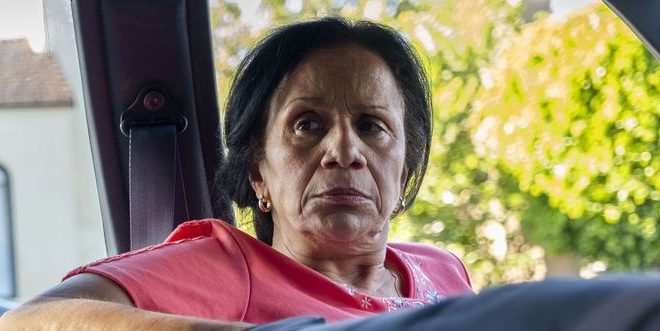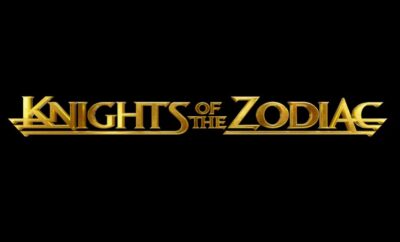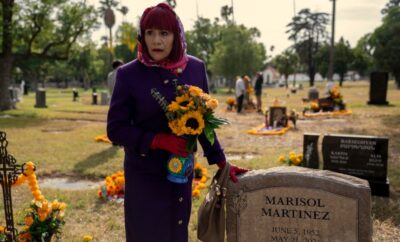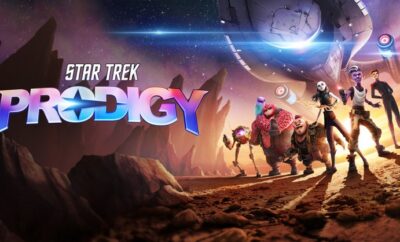 Nicola Goode/Netflix
Nicola Goode/Netflix
Interviews
Peggy Blow – On My Block
By: Lisa Steinberg
Q) We have seen you take on these dramatic diverse roles that really test and showcase your range. They have this incredible balance of vulnerability, complexity, comedy, and are incredibly compelling. How did this extend this season with “On My Block” and what draws you into or connects you with your character?
A) Wow! This is kind of the banquet – one of the few banquets we get in our careers. To walk in the room and there on the table is spread every flavor and taste you ever loved in your life. We got comedy, drama, everything in between. We’ve got a beat over here and a mislead over there. It’s a playground! It’s a playground to make all these wonderful, beautiful and (hopefully) clean transitions within the twenty-one-minute space. Good heavens! It’s a candy store. It really is. And for myself, and I’m sure for many, many actors who have been in the business for as long as I have, going back to the beginning for me it started in musical theater. In musical theater, when you’re learning (and what is so beautiful to me) you get a taste of everything in a safe environment. Whether you’re in school or community theater, you are really honing your chops for what is coming ahead professionally. Combing back through the years, I’ve had the opportunity to do these numerous times. To me, this is everything! I’m at the summit now! [laughs] This show is an answer to several prayers along the way because life itself can be a little treacherous. You have this marvelous magic that happens. There is something magical about ours where you can take all of these possible minuses, put them together and you create these amazing projects and this is one of them. I’ve always asked to be on one of them. I’ve always wanted to be on a project like this where my colleagues are good people of good character and it’s a joy to go to work every day. I don’t care if it is a 4am call, I walk into work skipping and smiling. Whistling a tune. [laughs] To be able to bring out all those areas of the human condition, no matter how painful, and to touch people…Mm. There is nothing like it. To move human beings, provoke thoughts and change lives…
Q) What is it about the OMB writers that understand crafting really witty, diverse and multi-dimensional characters that maybe other writers or networks don’t grasp as well?
A) Wow! It’s a few things I believe. It’s the writers themselves. It’s this particular, specific group of people. These are the most wonderful people I’ve come across in a very long time, collectively speaking and individually. I think a lot of the attribute goes to the fact that the writing staff is from such diverse backgrounds. Each of them comes from different strata – social stratas, economic stratas, emotional stratas – and from backgrounds that have a voice that may not be served completely or may not have been heard completely. So, they are always able to come together under this umbrella of “On My Block” and tell this story and reach into their bag of experience, their bag of compassion and their bag of empathy to be able to tell the story to be able to elevate a voice in our society that is not heard because of a host of reasons, I’m sure. It’s hard to hear, which is why I love this show so much. It says stuff that is very hard to hear, but they are telling it in such a way that you can’t not hear it and you can’t not want to hear it. If I can make another analogy, to me it was like Stevie Wonder’s music when I was a kid. You’re on the dance floor just bouncing, you are grooving all new long and subliminally you are learning wonderful lessons about compassion, anti-war and the better qualities of humanity. That’s what I like about “On My Block” is that I think it does the same thing. I think it serves the human condition in a palatable way and it touches everything. Yes, it’s humorous. Life is funny. Yes, it has death. Life has death. I think this show is a perfect reflection of what life is like in this wonderful microcosm and it comes from this staff of writers who realize that and they want to tell a truth. I think that’s why the writing is so good. They are not trying to spin anything or hide anything. They are laying out a story honestly and truthfully and I think that is what is so compelling, especially in this environment that we’re living in of alternative facts. [laughs] It’s heaven in so many ways because it is touching so many people in ways that are important to them – not to the staff or the cast – but to the people watching. I think this show serves the truth of the more we know about each other the more we are willing to let down our guard and say, “The more I look at a face that is not the color of my face or the eyes are not the color of my eyes, I just know that whoever that individual is or that group is those people are just like me. They are trying to be happy.” That’s all we’re all trying to do. I think in a very subtle way the show is serving for all voices to pay attention. Yeah, you’ve been heard, but you’re saying things that are incorrect and here is why. All you have to do is listen. There is nothing to be afraid of. I love this show for that!
Q) The show has a great ability of tugging at your heart strings and then tear you to pieces. So much gets packed into these short episodes, but every minute is filled with suspense, emotion, humor, and drama. How does the series and these themes balance these powerful, poignancy, provoking and engaging dimensions with its audience all within such short episode periods of time?
A) It all comes back to truth. When you lay it out, the writers tell how this happens and I think what makes this show very wonderful and unique is that nobody is trying to hit anybody over the head with points. “This is why guns are no good or this is why this is no good.” There is none of that. There is no browbeating in the show. What I think is so rich and makes it so dense with all of these delicious flavors is our staff doesn’t just deal with the positive and negative. They also deal with the neutral and I think that’s important. I think a lot of shows miss the neutral. In fact, the neutral is just as important as the positive and negative – in any scenario in the life. Most of us miss the important aspects of life when we’re so busy (especially in the Western Hemisphere) of what is going on next or “I’m bored” that I need something to stimulate. We’re constantly stimulated that we miss the wonderful moments and the neutrality in life that I think is so wonderful. That’s what ties the show together so well. Even in those neutral moments, there is something happening because in life in neutral moments there is still something happening. It may not be what is entertaining you, but it might behoove you to pay attention. Even when there are these brief moments (because, again, these stories are condensed and they’re tight), but in those wonderful neutral moments there is so much happening. The moments at Spooky’s (Julia Macias) house with all of those cats kicking around, you can see all of the energy from the characters on the porch. Nobody has to say anything. In terms of what the audience is expecting, they’re expecting something. But there is stuff going on right at that moment. Watch. Just look at it. I think people who catch that on the show will benefit them in life. Don’t miss the neutral.
Q) What I love about Abuelita is she pulls no punches, she keeps it real and suffers no fools. But also at her heart she genuinely cares for her family and the extension of friends. What is it that makes her be so guarded and yet at the same time pushes her limits of love? Why is it important we see these dimensions to these strong females at the forefront of the series?
A) I think Abuelita is everybody’s ideal of what a grandmother should be. I think that the writers put this character together with such truth and the language that comes out of her mouth…On social media I’ve got so many people saying, “Oh, she’s my grandmother!” [laughs] I think she’s everybody’s idea. Parents and kids have a different relationship than grandparents and kids. There is just something special about grandparents and kids. How many fairytale figures have we grown up with where the older female was guiding the young? For me Abuelita is my three aunts. I had three aunts. They were amazing! My aunt Velma, Falma and Alma. They were part of the great migration and went to Chicago. When they retired for working for Time Life Magazine they went back to Atlanta, Georgia, which was their home, and bought houses next to each other. That’s where the kids went and their children came and brought their kids. That’s the kind of environment I grew up in. When I read the script, I was like, “Oh my God! I’m home! I’ve arrived! I know these people.” [laughs] I think everybody who watches this show knows these people. Again, that’s what makes it so special. I know Abuelita very well. My Aunt Alma is the one who suffers no fools, my Aunt Velma is the neutral one who listens to you and guides you and then my Falma was like, “Here baby. Sit down and have a piece of cake. It’ll be alright.” [laughs] What I love about Abuelita is she understands those kids. She raised her own son. She grew up herself. She’s no dummy. She’s lived life. She wants like any older generation who loves their family to share their experience. And if they see you’re about to run into a wall they’d rather you not. But they realize that now they look pretty determined to run into that wall. I can grab them by the shoulders though and turn them in this direction. I think I’ll try that. Okay, I tried that. Oh, they turned back to the wall. Maybe I’ll just let them run into it one time. And that’s all it takes. Just like you had to make your own mistakes, you want to steer kids away and you do the best you can. Sometimes they take to it and sometimes they don’t. Sometimes they need to run into that wall. One time is generally all it takes if they’re listening.
Q) A I love scenes between Abuelita and Jamal, you two play so well reacting off of one another’s attitude and energy. Can you talk a little about working off of Brett and the dynamic chemistry that translates so well on screen?
A) Sometimes it just drops out of the ether and there is no explanation. Occasionally you come across another actor where you just connect. It was like we had worked together for years. I can’t put my finger on any one thing. And I have a great deal of respect for the young man. He is an open book and he watches and he learns. He’s like a little sponge. He just soaks it up. We have so much fun. We rehearse and then come together and work. We just have so much fun going to the absolute extreme of whatever it is and we crack each other up. So, there is just a natural chemistry there between Brett [Gray] and myself and I’m very thankful for that and for him – as well as the rest of the cast. But you are asking me about him specifically. Now, between he and Abuelita, I think she recognizes him as an old soul who is in this young body and he’s got it in him and she sees it. She sees it very clearly and she wants him to see it, too. Because he can’t really come to himself fully until he sees it – that’s the first season. She’s guiding him through it because he just didn’t’ see it. He didn’t think he had it in him and she did smack him one time, but he got it and followed it. [laughs] I think she sees a specialness in him that saw him through to the end. He did not let up until he found that money because he believed in her. She didn’t lie to him and that’s another thing. There is a trust between those characters that is so special and so wonderful. I don’t think they could get any closer if they were blood related. He’s a very dear friend of her grandson too so he’s part of the family. He’s not just a friend, he’s a part of the family. That’s what I love about these people, they embrace each other’s kids and nobody gets turned away. It’s hard sometimes. With Cesar (Diego Tinoco) it’s very hard. But no one gets turned away.
Q) What has it meant to you to be of this incredible series?
A) To be a part of this, uh! There is a lot of content out there, but I think “On My Block” rises to the surface. And I’m not saying that just because I’m on the show, but it’s a combination of everything we’ve talked about thus far.
Q) When you read the scripts for season what really stood out to you the most and what themes/messages were evoked?
A) I love where Laura [Iungerich] picks the story up. They are in eighth grade going on to high school. What a critical time in life for kids! I remember those days myself. It’s a very turbulent time with hormones jumping all over the place, your back foot is in childhood and your front foot is approaching adulthood. You are trying to balance somewhere in the middle and your emotions are all over the place. You see that a lot in all of them. A lot with Jamal, for sure. I like seeing that raw emotion of what that age is alike and the safety these kids have, even in Freeridge. There is a safety about the family unit. It’s bad enough you have to go through turning into a teenager and having to live within this world of heavy violence around you on top of all that. So, these children negotiating this and the way they are negotiating this with the guidance they have is just such a beautiful thing. And all teenagers can relate to that, regardless of social or economic background.
Q) Abuelita was the only one who believed in Jamal as he was searching for the Roller World money. But then once he had the money fit felt like such a continued curse which extended to anyone the cash came in contact with. It ends up being a bitter blessing for the bunch. How does really play into the saying that money is the root of all evil?
A) Interestingly enough, that adage has always left me a little askew. I had to toss that around a little bit. I don’t believe it. I don’t’ think I’ve ever believed that. Money is not the root of all evil. It’s merely a means to an end. Greed is the root of all evil. Desire and clinging to things are the root of all evil. I think that’s the lesson. This is the wall that Abuelita is letting them run into. But what a wonderful, safe place (as safe as it could be) for them to learn this lesson before they get out into the world and make those kinds of mistakes. We know they have the ability to launder money. [laughs] They’re fourteen! But this is the world we live in. Corporations do it every day, but there is a price to pay and I think that’s the lesson here for these kids and for those who watch. You can do that if you want to, you can go the easy root – go dig up some money out of a hole and take the steps it takes to clean that money. Now, how do you feel about yourself? Are you alright with that? Okay. Run for president then. [laughs] Then, I think the greater lesson is not money is the root of all evil. It’s that greed is the root of all evil because their purpose is change. The lines are drawn very quickly. First, it’s “I’m going to get me some Jordans. I’m going to get me this and that.” Then, it went from having things to saving Cesar. So, they are learning lessons about money before they even put their hands on it, which I think is just really smooth the way that was handled. So, by the time they got the money and saw it, yes it was overwhelming because they’d stepped into a world they’ve never been in before. Another thing about growing up is the unknown. And I think that’s good and that’s what I love about Abuelita. She didn’t stop them because this is their lesson to learn. It was amazing what they did with it. They learned a deeper lesson behind money, things and stuff – the greater lesson that will help them grow into better human beings.
Q) We meet Abuelita’s adversary Rosario as the curandera and they instantly clash, yet abuelita really has no choice to trust her and ask for her help. Then it turns out after all of that, and some extra cash, she still can’t heal her. In this tense situation we still get a lot of levity. What is it about this give and take we get in this moment that speaks to the ever-evolving tone the series sets?
A) That scene reminds me of the lengths parents and grandparents who love children will go to teach them a lesson. We had such a lovely time with that scene and playing with that scene that day. I think that scene is about friendship and we see that with the kids. I think this is a peek into the future because Abuelita says, “I’m not going to the doctor,” and Jamal says, “Well, La Curandera…” She’s like, “Rosario?! No, no, no.” They are enemies, but she does go to her. That says a lot right there and it’s more than just about no doctors. They knew each other back in the day. Rosario was selling bad weed. So, they have history and it’s (again) the belief. This is shamanism at its finest. What is that but belief and faith? In the scene where Abuelita has her hands in a bowl of ice he says this is malaria and this and she’s like this isn’t malaria. [laughs] Baby, calm down. He’s always going off the rails, which is so adorable and what kids his age do. She says it’s arthritis and won’t go to the doctor so he suggests the Curandera. Bless his heart! This money business has got him crazy because now he’s upset that she’s not working and can’t wash the money. So, I think in this scene she sees where this is going and she says, “Okay. Time to teach him a little something again.” She acquiesces and goes to see Rosario. They drag each other out and I love that. [laughs] That’s some personal stuff, which means they were probably running in the same circles so they know the deep and skinny on each other – clearly. How do you do that? You do that because you’re friends. Those are the people you know all the dirt on – the people you are closest to. So, here again you have faith, but the logic that happens in the scene – they talk through it. Even with the intercuts by the time we’re finished there we find out a lot. There is something in the house that doesn’t belong there. That’s a plot point that happens in that scene. I love that I get to be in a scene that happens. Something is in the house and they are thinking it’s the money and then we discover later on…we discover it’s not the thing. Again, it reveals the entire situation, not just what is in front of you. I think that’s a lesson that Jamal gets to learn in this. Later on they realize step by step by going through the logic as they stand at that trash can that it has done this and that – yes, they use the money as the object, but it’s not the money itself. It’s the greed behind the object. They are willing to burn the money until Abuelita comes out and says, “Don’t burn the money! The money is not the thing.” [laughs] They all went through that journey together – another point of richness. So much happens in that scene with plot points and Jamal is learning again something very important. And I think it’s going to make for a very rich Season 3. Are you listening Netflix?!
Q) And this season has had some great guest actors!
A) Our guest stars come on the show and it’s like they fall right in like puzzle pieces. We all have fun with them and they have fun with us. It’s almost like, “Bye! Be sure to come back!”
Q) What do you hope that fans take away from watching this season?
A) Aside from the obvious I want them to take away the desire to see a Season 3, 4, 5, 6, 7 and 8. We want them to have that desire. Other than that wow – so much! First, I have to say thank you because I think they are already walking away with a sense of satisfaction. At least that’s the sense I get that the audience is deeply satisfied. We’re seeing this richness of people of color on the screen together working through life and unflinchingly dealing with the issues and that’s fearlessness. That’s what it is. It’s fearlessness. I would like the audience to walk away from the show being fearless in your own life. When issues come down the pike, that’s just life. Just see it honestly, deal with it truthfully, have a piece of cake and everything is going to be alright! And don’t sweat the small stuff because it’s all small stuff.





You must be logged in to post a comment Login